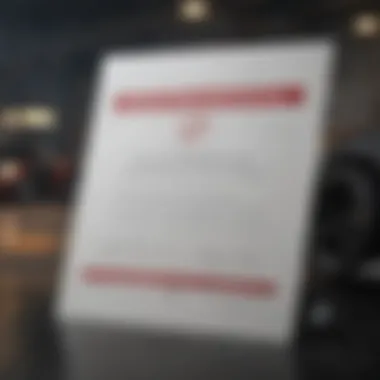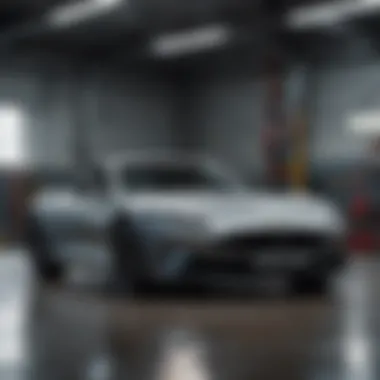Understanding Garage Liability Insurance for Automotive Businesses


Intro
Garage liability certificates of insurance are critical to the automotive industry. They provide important protection for businesses that deal with vehicles, including auto repair shops, dealerships, and service centers. Understanding these certificates can help you secure your business and avoid significant financial losses. This section lays the groundwork for comprehending why these certificates matter.
Simply put, a garage liability certificate of insurance covers risks associated with operations in the automotive sphere. Namely, it guards against claims of property damage or bodily injury resulting from accidents at your business premises. To navigate through this essential subject area, we must explore the fundamental components that define garage liability insurance and the pitfalls of being underinsured, or worse—uninsured altogether.
As we delve deeper into subsequent sections, you will gain a clear grasp of policies, coverage types, and regulations pertinent to this coverage. Knowing more about these elements empowers you. Such knowledge aids automotive professionals and enthusiasts in making informed decisions about what coverage is right for their specific operations. So let’s explore the intricate landscape of garage liability certificates of insurance further.
Key Components of Garage Liability Certificates
Understanding garage liability certificates of insurance involves looking closely at their main components. Primarily, these include coverage limits, types of coverage, and exclusions. Not the least of these elements is the extent to which they can protect your business.
- Coverage Limits: This defines the maximum amount an insurer will pay in the event of a valid claim. It’s essential for businesses to evaluate their exposure and set limits that cover potential liabilities adequately.
- Types of Coverage: These may include premises liability, operations liability, and products liability. Each category addresses different risk areas and offers varying degrees of protection for different business activities.
- Exclusions and Limitations: Knowing what is not covered by your license can shield you from rude surprises down the road. Often policies may exclude certain activities or incidents—such as non-business activities or deliberate acts.
Accurately understanding these components will ensure that your business is adequately protected from potential claims.
Consequences of Not Having Proper Coverage
A lack of adequate garage liability insurance can lead to dire consequences for an automotive business. One pertinent example is the crippling financial burden posed by legal defense costs, even just to respond to unfounded claims.
Even an insignificant claim can engulf your finances & reputation overnight.
Moreover, the lack of coverage can strike hard when facing substantial liability damages. Such damaging claims can include:
- An injured pedestrian due to poor maintenance at the garage.
- Property damage caused by a vehicle serviced at your deficit.
- Accidents happening on your property grounds during business hours.
The tough truth is that many businesses facing lawsuits wish they had empowered themselves through proper insurance. Some survive, but the stakes can be high.
Regulatory Aspects
Each state in the U.S. has regulations in place governing the necessary coverage levels and types for businesses. Different regions may also present varying requirements based on local risks and demographics. Thus, staying compliant with local regulations should be at the forefront of obtaining a certificate.
• Consult your local insurance agent: An informed agent can pinpoint the exact requirements your business must meet based on location and operations. • Review the minimum coverage laws: Some states mandate minimum liability limits that require coverage for bodily injury and property damage.
Understanding these regulations upfront can save considerable trouble in the long run. It also reinforces the importance of staying up-to-date with local laws.
By now, you can appreciate the importance of garage liability certificates of insurance. They are not just mere documents but safeguards for businesses operating within the automotive sector. Awareness of their key components, the potential risks in not obtaining one, and mandatory regulations can either alienate or fortify your business dealings in the automotive industry. Let us now turn to how we can help you make informed decisions when obtaining a garage liability certificate of insurance.
Prologue to Garage Liability Insurance
Understanding garage liability insurance is essential for anyone involved in the automotive industry. This form of insurance protects businesses that repair, maintain, or service vehicles. Knowing about it helps automotive professionals make informed decisions that can safeguard their operations and finances.
Definition of Garage Liability Insurance
Garage liability insurance is a specialized policy designed for businesses engaged in automotive work. This includes repair shops, dealerships, and service stations. The main function of this insurance is to provide coverage against claims from third parties due to bodily injury or property damage related to the business operations. Essentially, it acts as a safety net for businesses, defending them in the unfortunate event of a lawsuit.
Importance in the Automotive Industry
The significance of garage liability insurance cannot be overstated in the context of automotive enterprises. Firstly, it mitigates financial risks that arise from accidents or mishaps that may occur on the premises or during vehicle servicing.
- Protection from Legal Claims: In the automotive sector, the potential for accidents is continuous. Garage liability insurance covers costs related to legal claims, which can otherwise drain business resources.
- Enhancing Credibility: Possessing a valid garage liability certificate assures customers of a commitment to responsible practices. It enhances a business's industry reputation.
- Compliance with Regulations: Many states mandate businesses in this sector to carry certain levels of insurance. Having garage liability insurance ensures adherence to legal requirements.
In summary, garage liability insurance is not merely an expense; it is an essential layer of protection that can ensure the sustainable operation of automotive businesses.
Components of a Garage Liability Certificate


The Components of a Garage Liability Certificate are essential for understanding how the insurance protects automotive businesses from numerous risks. This section dives into key elements that constitutes the certificate, unpacking what each part means, its benefits, and the considerations involved.
Coverage Limits
Understanding Coverage Limits is crucial for asserting the degree of protection a garage owner gains from their liability insurance. Coverage limits refer to the maximum amount an insurance company will pay for a claim. This means that if a claim exceeds this amount, the garage owner must cover the difference.
The specification of coverage limits varies by firm and policy. Business owners should assess their unique operational risks when determining these limits. Going with an inadequate coverage limit can expose a business to potential financial peril, especially in high-stake scenarios like lawsuits or extensive property damage claims.
Some common key points include:
- Different aspects of coverage can have separate limits.
- Premium amounts correlate to the chosen coverage limits.
- Higher limits provide stronger protection, but also increase costs.
It's prudent to consult with an experienced insurance agent to find the sweet spot between coverage limits, affordability, and adequate protection.
Exclusions and Limitations
Regarding Exclusions and Limitations, every garage liability policy outlines specific situations whereby claims will not be honored. A clear understanding of these exclusions can prevent misunderstandings and surprises if an incident occurs.
Some typical exclusions may relate to personal property damage, injury due to employee negligence, or acts of nature. Knowing this helps owners strategize their risk management approach effectively. Furthermore, limitations define the circumstances under which the coverage can be appropriate and ensure that no ambiguity exists.
It's vital for business owners to glean insights into exclusions that pertain to their specific type of garage operations. This can include:
- Full review of their current policy documentation.
- The ability to contact insurers for clarification regarding limitations related to particular situations.
- Potential ways to mitigate or eliminate certain exclusions with endorsements or separate policies.
Regular discussions about exclusion clauses with an experienced broker can enable more informed decisions in crafting a robust policy.
Additional Insured Parties
The term Additional Insured Parties refers to entities or individuals added to a garage liability policy, ensuring they too are protected under the coverage. Including these parties helps maintain smooth operational relations and may be mandated by business contracts.
Usually, automobile dealerships or business partners may be listed as additional insured parties. It’s economical and thoughtful, offering layers of protection for stakeholders evenly involved in operations. Below are important things that add emphasis:
- Verifies each party’s coverage in contracts.
- Simplifies handling complex situations engaged with multiple stakeholders.
- Enhances credibility while negotiating business agreements.
It’s also necessary for owners to periodically analyze whether the list of additional insured parties remains accurate as partnerships and legal obligations change over time. Keeping this updated can prevent unfortunate lapses in coverage that may impact business viability.
Types of Coverage Offered
Garage liability insurance comprises several forms of coverage that cater to the complex risks associated with the automotive industry. Each type serves a distinct purpose, but together, they create a robust safety net for businesses. Understanding these types of coverage they offer is vital for any automotive professionals or enthusiasts seeking to minimize their risks while operating in this sector. It is essential to make informed decisions about what coverage suits their specific business model and environment.
General Liability Coverage
General liability coverage serves as the cornerstone of a garage liability certificate. Its primary focus is to protect businesses from claims that arise from bodily injury or property damage that occurs on the premises. This type of coverage is crucial as it addresses incidents involving clients, vendors, or even passerby who might suffer injuries while at the business's location.
Some key aspects include:
- Bodily Injury Protection: In case someone gets hurt on the property, this coverage helps cover medical expenses and legal fees associated with the injury.
- Property Damage: If a client’s vehicle or property gets damaged while in the care of the business, general liability kicks in to address potential costs.
- Defense Costs: This coverage also includes legal defense fees, a critical feature for safeguarding business assets against litigation claims.
In modern automotive operation, general liability coverage is more than a recommendation; it is a necessity that affords peace of mind.
Product Liability Coverage
Product liability coverage is another essential pillar in enhancing a business's insurance framework. Businesses face risks associated with selling defective products, which can cause injury or damage either to the user or their property.
How product liability coverage aids businesses includes:
- Addressing Faulty Product Claims: If a product used by the client fails and results in injury or damages, this coverage will handle subsequent claims effectively.
- Financial Protection: The financial burden of defending lawsuits related to faulty products extends beyond just the replacement cost. Product liability coverage protects against those crippling expenditures.
- Maintaining Customer Trust: Having robust product liability coverage demonstrates a firm commitment to safety and quality, which can help to build a loyal customer base in an inherently trust-driven market.


Overall, any business engaged in selling parts or equipment should consider this protection vital.
Garagekeepers Liability
Garagekeepers liability is specifically tailored for businesses providing storage or custodial service for various vehicles or items, integrating its own unique protection layer.
This coverage helps when:
- Vehicles Are Damaged: It covers damages to clients' vehicles while in the property’s custody, which is vital given that work performed on those vehicles could lead to unexpected repercussions.
- Prompting Client Confidence: With this coverage, businesses can earn client trust as they feel more secure leaving their vehicles in safe hands.
- Fulfilling Legal Requirements: Some jurisdictions may mandate that businesses offering vehicle storage hold garagekeepers liability coverage.
Thus, this specific insurance type serves as an essential consideration in safeguarding both business and client assets.
How to Obtain a Garage Liability Certificate
Acquiring a Garage Liability Certificate is a crucial aspect for automotive businesses looking to protect themselves from various risks. A well-structured insurance policy not only shields against potential lawsuits but also helps maintain the reputation of the business. Therefore, understanding how to obtain this coverage is essential for any automotive professional.
Assessing Coverage Needs
Before venturing into finding an appropriate insurance provider, it is vital to assess your specific coverage needs accurately. Each business has its unique exposures and requirements that must be addressed. Here are key elements to ponder:
- Type of Repairs or Services Provided: Different businesses, whether they deal with automobile repairs, sales, or detailing, may face varied risks.
- Number of Customers: Higher customer foot traffic can lead directly to more potential liabilities.
- Location Considerations: An urban environment may have distinct risks compared to rural areas. Consider crime rates and local traffic patterns.
After identifying these aspects, you should consult with industry colleagues or even experienced professionals. They may provide insight on what coverage limits and types have worked best in similar situations.
Finding a Reliable Insurance Provider
Once you've determined your coverage needs, the next step involves identifying a trusted insurance provider. Not all insurers offer the same quality of service or coverage reliability. Here are steps to help you select a dependable provider:
- Research Providers Online: Reviews and ratings on platforms like Trustpilot or Reddit can provide detailed insight into a company's reputation.
- Ask for Recommendations: Networking with peers in the industry often yields valuable suggestions.
- Verify Financial Stability: Assessing a provider's financial health ensures they can cover claims if needed. Look for ratings from agencies like A.M. Best.
- Compare Quotes: Gathering multiple quotes allows for evaluating coverage details and pricing.
Selecting a provider may seem daunting, but thorough research minimizes the chances of making a selection that does not serve your needs adequately.
Completing the Application Process
Completing the application for a Garage Liability Certificate is straightforward, yet careful attention to detail is essential. The application process often consists of several critical steps:
- Gather Necessary Documents: This can include business registration details, financial records, and evidence of existing coverages.
- Fill Out Application Form: Providing accurate information upfront minimizes processing delays. Don’t simplify answers to complex questions; provide depth where necessary.
- Review Terms and Conditions Thoroughly: Ensure you understand policy exclusions and covered events before signing.
- Communicate Well with the Insurer: Miscommunication can lead to unclear policy terms. Clarifying any doubts during the application process is vital, ensure you are fully aware of what is covered.
Following these steps carefully will facilitate obtaining the Garage Liability Certificate you'd require, securing your business from potential liabilities effectively.
Regulatory Considerations
Regulatory considerations are crucial in ensuring that businesses in the automotive sector maintain appropriate and effective garage liability coverage. The complexities of regulations intersect with operational realities, necessitating a clear understanding of both state-specific requirements and the trends in regulatory practices. By adhering to these guidelines, businesses can mitigate risks while promoting a culture of responsibility and compliance.
State-Specific Requirements
Each state has its own unique set of requirements regarding garage liability insurance. These can include specific minimum coverage amounts, stipulations on the types of coverage that must be maintained, and proof of coverage submission deadlines. It is vital for automotive businesses to familiarize themselves with local laws to avoid potential penalties or lapses in coverage. Failure to comply with state requirements can lead to legal ramifications and insurance claims being denied.
Understanding varying requirements across states can also help businesses operate more efficiently. A thorough examination of provisions in, for instance, California, comparing them with those in Florida, is indeed a pressing priority for companies operating in multiple locations. Many states incentivize businesses to maintain adequate insurance through lower rates or benefits yet impose hefty fines for non-compliance.
Trends in Regulation
The landscape of regulation surrounding garage liability insurance has evolved significantly in recent years. There is an increased push towards protecting consumers and ensuring that businesses uphold their responsibilities. More states are formulating stricter guidelines on coverage, particularly focusing on consumer protection measures.
A noticeable trend is the implementation of transparency-related regulations, requiring businesses to disclose more information about their coverage. This move is expected to foster enhanced trust between customers and automotive service providers, ultimately benefitting the industry. Another key development includes the rise of technology's role in insurance regulation. Digital recordkeeping and automated reporting are becoming commonplace.
The alignment of technology with regulatory frameworks presents ambitious challenges, requiring businesses to stay current and updated. Adapting to these changes is essential to maintain compliance. Regularly consulting with insurance providers or legal professionals can provide timely insights into regulatory alterations.


Staying informed on regulatory trends can protect businesses from disruptions and unexpected costs associated with non-compliance.
Maintaining awareness about both state-specific requirements and global trends ensures automotive businesses function with better security and can focus on providing superior service to their clients.
Consequences of Inadequate Coverage
In the realm of garage liability insurance, having adequate coverage is not a mere suggestion; it is a necessity. Businesses operating in the automotive sector face various risks daily. Without sufficient insurance, they expose themselves to substantial financial and legal repercussions. An insufficient policy may result in dire consequences that affect not just the business but also its employees and customers.
Financial Risks
The financial implications of lacking appropriate coverage are significant. Without a robust garage liability insurance certificate, a business may find itself footing bills from accidents, injuries, or damages that exceed their coverage limits. This could occur in situations like a client’s car being damaged during maintenance or a customer injuring themselves on business premises.
Besides direct costs, inadequate coverage can lead to loss of reputation, biting into customer trust and future revenues. The money lost cannot be recouped easily, which may push a business into bankruptcy. Here are specific points to consider in regard to financial risks:
- High Repair Costs: If an incident occurs and the coverage is limited, costs to repair might fall solely on the business.
- Insurance Liabilities: Businesses may face higher premiums in the future when they do seek coverage following an incident.
- Dependency on Current Assets: With heavy financial burdens, resources currently used for daily operations might be redirected to pay off claims and debts.
These risks emphasize the necessity of a comprehensive garage liability insurance program.
Legal Implications
Inadequate coverage can also trigger serious legal implications for automotive businesses. When insurance does not cover mandated liabilities, it places owners at a greater risk for lawsuits. for example, If someone is injured on the property, the business may be personally liable for medical expenses or compensation claims, affecting business continuity.
Here are critical legal issues stemming from insufficient coverage:
- Increased Litigation: Legal battles can arise in pursuit of damages, leading to prolonged disputes with business owners exposed to financial losses and reputational risk.
- Regulatory Fines: Depending on jurisdiction, failing to provide adequate insurance might lead to fines or sanctions.
- Existential Threat: Legal actions and claims can result in insurmountable debt or even the closure of the business altogether, with proceedings dragging on for years.
A thorough understanding of liability needs prevents stressful situations for automotive businesses. Knowing the consequences of not having appropriate coverage lays the groundwork for prudent decision-making, ensuring long-lasting stability.
Being informed on the levels of coverage needed acts as a first line of defense against potential hazards that can arise in the industry.
Best Practices for Maintaining Coverage
Maintaining the right coverage is indispensable for any business involved in the automotive sector. Neglecting this can lead to severe consequences that affect both financial stability and reputation. In this section, we will explore effective practices to ensure that your garage liability insurance remains comprehensive and up-to-date, thus safeguarding your business from unexpected risks.
Regular Policy Reviews
Regular policy reviews are critical for ensuring that your garage liability insurance aligns with your current business needs. Many factors can change, including your operations, employee count, and changes in state regulations that could require additional coverage. It is advisable to conduct a thorough review at least annually.
- Identify changes: Reflect on any alterations in your business operations. Perhaps you’ve expanded your services or hired additional staff. Changes like these might necessitate adjusted coverage limits.
- Evaluate net risks: Consider your evolving risk exposure. Have you noticed a rise in customer footfall or a higher volume of passed vehicles? Assessing risks allows you to proactively adjust your policy for optimal protection.
- Consult your advisor: Maintaining an ongoing relationship with your insurance agent is beneficial. They can offer insights based on the current market and possibly suggest updated options that are better tailored to your needs.
Regular evaluations yield not тільки compliance, but also financial security.
Staying Informed on Industry Changes
In today’s fast-paced automotive world, it’s crucial to remain informed on changes affecting the industry. Insurance policies aren't static and can be influenced by new services, technological improvements, and shifts in regulatory frameworks. Staying updated on trends helps businesses adapt effectively.
- Subscribe to industry news: Services such as Automotive News or local auto dealerships often provide valuable insights into the changing landscape.
- Participate in forums: Engaging in online communities on platforms such as Reddit allows for the exchange of ideas and issues with peers. Here, you will encounter discussions on practices being adopted in the industry that may impact coverage requirements.
- Attend conferences: Industry events often present seminars about the latest regulations affecting your business’s insurance policies. These gatherings provide invaluable networking opportunities and up-to-date insights.
By aligning your coverage with ongoing changes, your business becomes resilient against potential disruptions.
End
Garage liability insurance is essential for anyone operating a business in the automotive sector. Its importance cannot be understated. As discussed throughout this article, this coverage protects against potential claims that can arise during routine operations, shielding the business owner from a variety of financial burdens.
Recap of Key Points
Understanding the significance of a garage liability certificate provides clarity in decision-making for automotive professionals. Here are some important takeaways:
- Coverage Overview: Garage liability insurance encompasses general liability, product liability, and garagekeepers liability.
- Essential Components: The certificate includes critical elements such as coverage limits, exclusions, and additional insured parties.
- Acquisition Process: Steps include assessing specific business needs, choosing a reputable insurance provider, and completing a detailed application.
- Regulatory Landscape: Awareness of state-specific requirements and trends in regulation is vital as these factors directly influence coverage options and obligations.
- Maintenance of Coverage: Regularly reviewing policies and staying updated on industry changes helps ensure adequate protection.
Final Thoughts on Garage Liability Insurance
In sum, investing in a garage liability certificate is more than a mere formality. It offers a safety net for businesses against unforeseen occurrences, thereby providing much-needed peace of mind. Operators can concentrate on their daily challenges, knowing they have the necessary protections in place. This certificate serves as a testament to the professionalism and commitment to safety that automotive businesses are expected to maintain. As you venture into this sector or continue building your business, prioritize reviewing and strengthening your insurance coverage. An informed selection sheds light on the responsibilities and safeguards inherently associated with garage operations.



